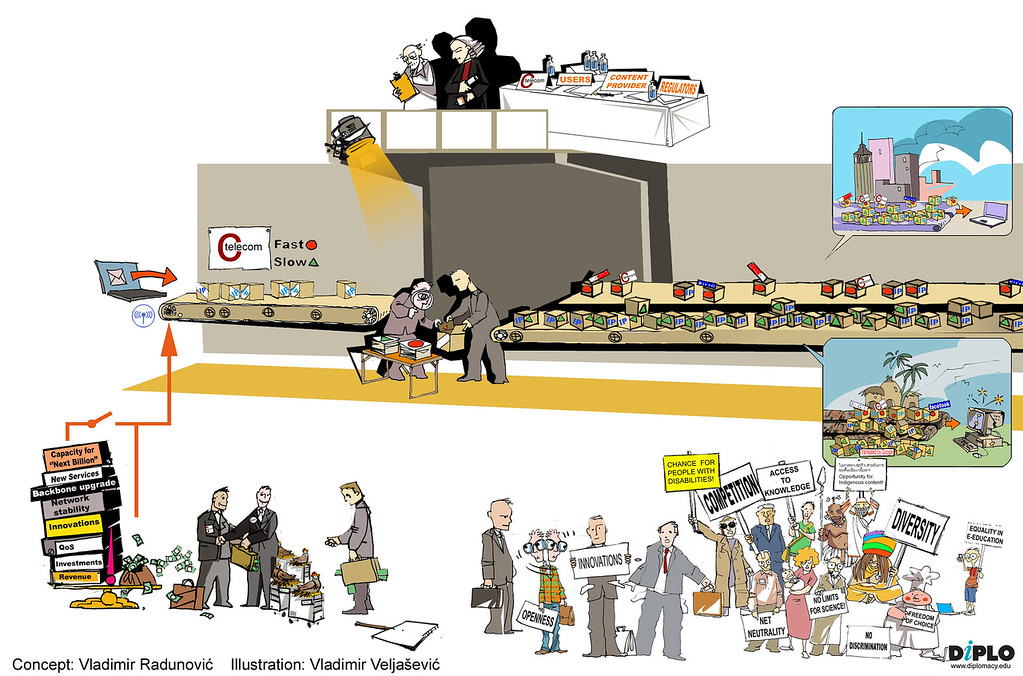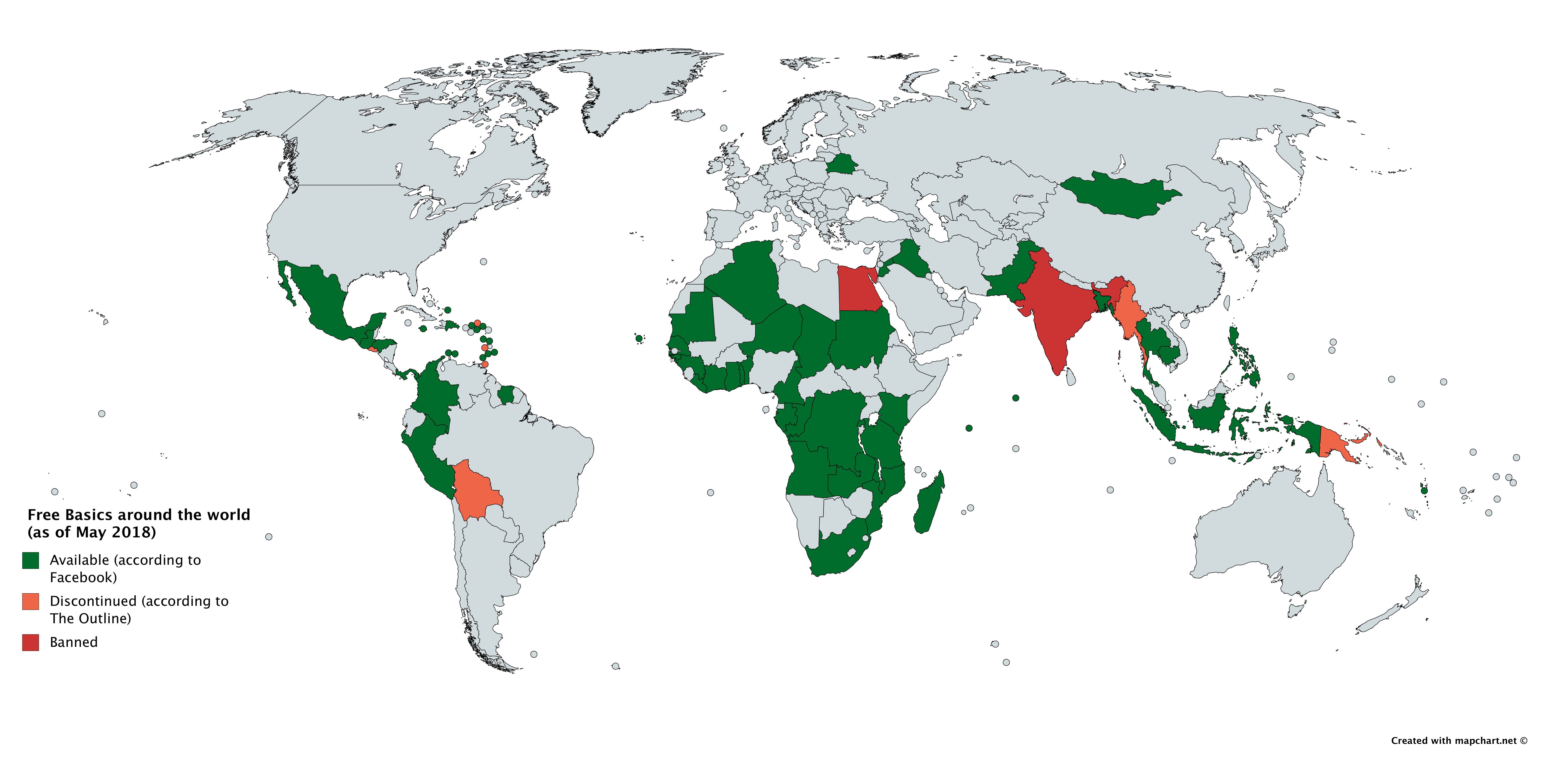The Network Neutrality Debate Which Is Expected to Surface Again This Fall Quinstreet Enterprise
Net neutrality and zero-rating
Cyberspace neutrality is the principle that Internet operators should treat Cyberspace content equally. Thus, for instance, providers such every bit Verizon, Swisscom, NTT, and others should not throttle Skype or Netflix to encourage customers to purchase packages with faster speeds. Zero-rating is similarly frowned upon; such services allow unlimited (free) utilize of specific applications or services, without the data counting towards a subscriber's information threshold.
The Internet's success lies in its design, which is based on the principle of net neutrality. From the outset, the catamenia of all the content on the Internet was treated without bigotry. New entrepreneurs did not need permission or market ability to innovate on the Internet.
With the evolution of new digital services, especially the ones consuming big amounts of bandwidth such as high-quality video streaming, some Cyberspace operators started prioritising certain traffic – such as their ain services or the services of their business concern partners – based on their business organization needs and plans. They justify this a discriminatory approach by citing demand to heighten funds to further invest in their networks. Internet neutrality proponents strongly fight back such plans arguing that this could limit open admission to information and online freedoms, and stifle online innovation.

Are all bits created equal? Since the early days of dial-upwardly modem connection to the Cyberspace, network traffic management has been used to prioritise certain traffic. For case, Net traffic carrying Voice over Cyberspace Protocol (VoIP) services (such as Skype) should have priority over traffic carrying a uncomplicated email: While nosotros can hear delays in Skype voice chat, we volition non detect modest delays in an e-mail commutation.
With the continuously increasing need for loftier bandwidth – prompted by over-the-top (OTT) services such as VoIP and picture streaming – traffic management has go increasingly sophisticated in routing Internet traffic in the most optimal way for providing quality of service, preventing congestion, and eliminating latency and jitter.
Initially, cyberspace neutrality purists argued that 'all $.25 are created equal' and that all Internet traffic must be treated equally. Telecoms and ISPs challenged this view, arguing that users should have equal access to Internet services and if this were to happen, Internet traffic could non be treated as. If both video and e-postal service traffic were treated every bit, users would not have good video-stream reception. Eventually, this rationale was no longer questioned.
The emergence of OTT services
In the past few decades, network operators adjusted their business organization models to introduce their own OTT services such as video-on-need or IPTV (idiot box via the Internet), in improver to providing Internet access. They now compete not just with their counterparts for providing cheaper, faster, and better quality Internet connections, but besides with OTT service providers.
What are the consequences of these new services? Outset, in this new competitive environment, operators are often tempted to prioritise packages, for instance, by slowing down or banning the period of data packages from a competing company, while giving priority to data packages of its ain in-house service.
Second, operators fence that the demand for more bandwidth – spurred generally by OTT services – crave them to invest more in basic infrastructure. In their view, since OTT service providers are the ones benefiting the most from the improved infrastructure, a multi-tiered network policy model that requires providers to contribute financially would guarantee the necessary quality of service for OTT consumers.
Null-rating services
The controversial zero-rating services are one of the industry's main attempts to increase revenues through new business models. Offered mainly to customers by mobile telecom providers, these services let unlimited (gratuitous) utilise of specific applications or services, without this use counting towards a subscriber'due south data threshold. In some cases, users are allowed admission even without a information plan.
One of the main arguments in favour of zero-rating is that it lowers the cost of access to online information (when offered as role of a data programme), and gives admission to some online data to users who cannot afford a data plan (when admission is free of charge). Supporters consider access to some data is preferable to no access at all.
Opponents contend that aught-rating prioritises sure services over others, and therefore challenges the net neutrality principle while harming marketplace contest and innovation. Some besides express business concern over the implications that zippo-rating could accept on users' homo rights, in that such services can conflict with a user'due south correct to information.
Debates on zilch-rating became more intensive post-obit Facebook'due south introduction of Free Basics in 2014. Offered by Facebook and its partners (the partnership is called Internet.org) in several developing and less developed countries, the service allows users of mobile communications to access applications such as Wikipedia and AccuWeather – in addition to Facebook – without incurring data charges. Debates led to the suspension of the service in some of the countries where it had been previously introduced, such as Bharat and Egypt. This map shows the current condition of Free Basics around the earth.

Regulating net neutrality: Policy approaches
Why regulate? A breach of net neutrality principles could harm competition as it would atomic number 82 to discrimination confronting other (usually smaller) service providers, and would stifle innovation. The counter-statement is that regulation could also discourage big companies from investing in the infrastructure.
The consequences of breaching net neutrality principles are not but economic. The Internet has become one of the central pillars of mod lodge, and is linked to basic human being rights, including access to information, health, didactics, and freedom of expression. Endangering the openness of the Net could therefore impact cardinal rights. Whether access to some information is preferable to no admission at all is still highly debated.
In addition, the ability to manage network traffic based on origin or destination or on service or content could give government the opportunity to filter Internet traffic with objectionable or sensitive content in relation to the state'southward political, ideological, religious, cultural, or other values. This opens up possibilities for political censorship through Internet traffic direction.
How have countries been regulating internet neutrality? One of the major challenges that regulators have always faced is whether to human activity preemptively (ex-ante) in order to prevent possible breaches of the net neutrality principle, or to respond based on precedents (ex-post) one time (and if) the breach occurs.
Another challenge is whether the issue should be dealt with hard law (encoding the principles into legislation) or soft law (through guidelines and policies).
In the United states, the Federal Communications Commission (FCC) adopted a set of rules to safeguard the principles of net neutrality. Entered into force in June 2015, the rules banned 3 practices that are seen as harming an open Internet: blocking of lawful content, applications, services or devices; impairing or degrading lawful internet traffic on the ground of content, application, or service (throttling); and, the paid prioritisation of certain content, applications, or services. In 2018, under a new administration, the FCC repealed the 2022 rules. The FCC'south Restoring Cyberspace Liberty Gild took issue in June 2018, restoring the classification of broadband Net access service every bit a lightly-regulated data service. Following this decision, which was met by heavy criticism, many The states states – including Washington, Oregon, and Maine – have started enacting their own net neutrality rules.
In the Eu, Regulation 2015/2120 obliges providers of Internet admission services to treat all traffic equally when providing Internet admission services. This means treating all traffic without discrimination, brake, or interference, and irrespective of the sender and receiver, the content accessed or distributed, the applications or services used or provided, or the final equipment used. The regulation likewise deals with specialised services, allowing operators to offering 'services other than Internet access services which are optimised for specific content, applications, or services, or a combination thereof, where the optimisation is necessary in order to see requirements of the content, applications, or services for a specific level of quality'. The regulation was followed by a set of implementation guidelines, issued by the Body of European Regulators for Electronic Communications (BEREC).
Brazil, Chile, Slovenia, and the Netherlands protect internet neutrality through national legislation. Kingdom of norway chose a soft-law arroyo, with the national regulatory authority issuing a ready of guidelines for network neutrality (drafted in collaboration with various industry players and consumer protection agencies).
Source: https://dig.watch/topics/network-neutrality
0 Response to "The Network Neutrality Debate Which Is Expected to Surface Again This Fall Quinstreet Enterprise"
Post a Comment